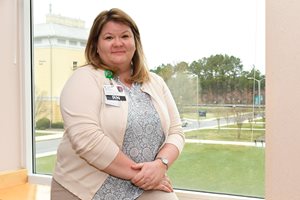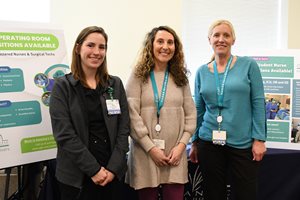
Angela Brittingham, chief nursing officer of TidalHealth in Salisbury, says the Lower Eastern Shore still has a strong need for skilled health care workers, and Wor-Wic Community College is helping to fill that need.

From left, Amy Edwards, medical-surgical clinical educator, Erin Cowder, recruiter, and Bonita Conner, surgical services manager, all of Atlantic General Hospital in Berlin, visited Wor-Wic Community College to talk to nursing students and highlight available jobs.
Health care’s COVID-19 crisis mode is in the past, but there is one refrain still recurring: the need for more skilled health care workers.
The pandemic highlighted the necessity, but the major cause is an aging workforce. The U.S. Bureau of Labor Statistics (BLS) says that retiring nurses are projected to leave more than 203,000 job openings per year through 2031.
At the same time, that aging population also has more health care needs, so the demand for nurses is projected to grow by 6% each year in that period. For health care providers as a whole, 13% growth is projected. Maryland’s Lower Eastern Shore is no exception – which is why recruiters from local health care organizations are becoming a common sight on the campus of Wor-Wic Community College.
“There are all kinds of opportunities for people in health care here,” said Angela Brittingham, chief nursing executive at TidalHealth. “Acute care, long-term care – there are jobs at the hospitals and at satellite locations. We need certified nursing assistants, licensed practical nurses, registered nurses, med techs and rad techs. Any health care field is going to be in demand in our area.”
Brittingham earned her nursing degree at Wor-Wic, and went on to earn bachelor’s and master’s degrees in nursing; now she is working on finishing a doctor of nursing practice degree. She says she appreciates the good foundation it gives to those starting out in health care. “Nurses graduate from Wor-Wic ready to hit the ground running,” she said. “And they’re local, so they want to care for their families, friends and neighbors just like we do at TidalHealth.”
TidalHealth and other local health care facilities not only recruit Wor-Wic graduates, but also offer students a training ground as they complete practicums – real-world training that is part of the curriculum.
“Wor-Wic’s healthcare programs are vital to our community and support the workforce demands to help us care for our patients in the community,” said Mandy Bounds, vice president patient care services and chief nursing officer for Atlantic General Hospital.
At Atlantic General Hospital, nursing students are welcomed in paid student nurse positions and summer internships. “The nurse internships are 10 weeks, for 40 hours a week, for students going into their final year of nursing school – between the LPN and RN year,” said Bonita Conner, RN, a surgical services manager at Atlantic General and a Wor-Wic graduate. “They get really good experiences.”
“We also offer LPN-RN positions and LPN positions for those who would like to work as a LPN and not pursue their RN at this time,” Bounds said.
Bounds earned her nursing degree at Wor-Wic and furthered her education to earn a bachelor’s, master’s and doctor of nursing practice degree. “Wor-Wic graduates are prepared and ready to meet the needs of our local hospitals. At Atlantic General Hospital, we value our partnerships for training of the future graduates of the Wor-Wic programs,” Bounds said.
Students who have these experiences will have a more solid grasp on skills they can then bring, after they graduate and obtain a license, to a full-time nursing job in Atlantic General’s medical-surgical department, the operating room, emergency department or intensive care unit.
Erin Cowder, a recruiter for Atlantic General, said the organization values Wor-Wic students. “Our goal is to build even more programs with Wor-Wic,” she said. “There is always a need.”